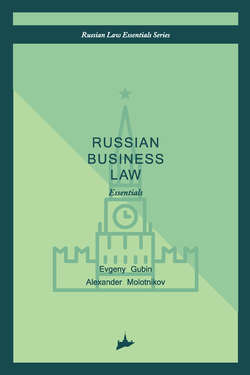Читать книгу Russian business law: the essentials - - Страница 10
Alexander Molotnikov,[3] Levon Garslian,[4] Andrei Gabov[5]
Introduction to Business Law in Russia
4. Entrepreneurship as a Legal Concept, and Business Law Principles
ОглавлениеAnother important thing to understand regarding specific rules of business law, is the legal approach towards entrepreneurship, along with business law principles.
In the Russian legislation, entrepreneurship is defined as an independent activity, aimed at regular receipt of profit from use of property, product sale, implementation of works, or service delivery carried out at their own risk by persons registered according to the laws (article 2.1 of the Civil Code of the RF). Thus, any activity can be declared entrepreneurship if it has the aforementioned features, in other words, (1) independence, 2) risk character; 3) focus on regular receipt of profit. Although it is not directly indicated in a given definition of entrepreneurship, the word «activity» itself indicates it must be a continuous, regular, not a single act, and be carried out for a more or less a certain time period.
The principles of business law form the basis for being a separate area of law, and determine its unity. The principles of the market economy underlie business law principles, as market relations are the subject of business regulation.
The following principles of business law are usually mentioned by legal scholars,[14] inter alia: (1) freedom of entrepreneurship, (2) variety and equality of ownership forms, (3) economic space integrity, (4) competition and limitation of monopolistic activity, and (5) state business regulation. These and other principles of business law are explained further in this book.
The principle of entrepreneurship freedom is enshrined by Article 34 of the Constitution of the RF, establishing that “each person has the right to freely use his abilities and property in order to carry out business and other economic activity not prohibited by a law.” The same article of the Constitution bans economic activity aimed at monopolization and unfair competition.
Another important principle relates to state regulation of economy and entrepreneurship. For example, article 71 of the Constitution of the RF includes the following spheres into the jurisdiction of the Russian Federation, inter alia:
(1) federal policies and programs in the area of state, economic, ecological, social, cultural and national development of the Russian Federation;
(2) legal framework of a single market; financial, foreign exchange, credit, and customs regulation, monetization, pricing policy; federal economic services, including federal banks;
(3) federal budget; federal taxes duties; federal funds of regional development;
(4) federal property and its management.
The principle of state regulation is enshrined not only in the Constitution of RF, but also in the constitutions or charters of the Russian Federation constituent territories, federal and local laws, and other legal acts.
Finally, the integrity of the economic space is another core principle of market economy and business law. In accordance with articles 8 and 74 of the Constitution of the RF, the integrity of economic space, free movement of goods, services and financial resources, support for competition, and the freedom of economic activity are guaranteed in the Russian Federation.
Now, our reader has the necessary background. Let your journey to the Russian business law begin! We hope you will enjoy it.
14
See, for example, I. V. Ershova, G. D. Otnykova, Russian Business Law, 2011.
